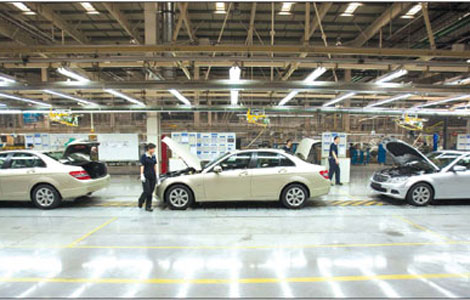Web Comments
Fluctuating prices damage airline industry
Updated: 2011-01-28 15:40
By K M Rehan Salahuddin (chinadaily.com.cn)
China has one of the largest domestic flight industries in the world. Almost every city has plenty of flights departing and arriving every day. Airline companies are offering more features and trying to offer the lowest price. One airline company is even trying to get permission to allow passengers to stand on short flights. But unstable ticket pricing prevents the establishment of a strong consumer base.
In recent times, the difference between the highest and lowest prices for every journey has been vast. Sometimes prices in the days leading up to a flight can increase more than 100 percent from the original price. An economy class ticket from Beijing to Wuhan would cost 500 yuan ($76) on average. It has been observed that throughout the year the consistency of price is very low. Sometimes a ticket is priced only 300 yuan ($46) and sometimes it is more than 800 yuan ($122).
It is widely anticipated and arguably accepted that prices increase around the time of Chinese New Year. But for prices to keep changing for a particular flight throughout the month is unacceptable.
A large proportion of passengers travel by air because of a desire to reach their final destination in the shortest possible time. These passengers often try to buy tickets only one day ahead or on the same day as the journey. But based on most well-known air ticket selling websites, the price for a particular flight on a particular day rises with time and reaches the highest possible price on the final day of sale. These variations in prices will surely affect consumers' willingness to buy a ticket.
When a customer buys an air ticket, they have to consider transportation to and from the airport, the cost of which is also a factor. As transportation to and from railway stations is generally easier and cheaper, many passengers take trains.
There is no longer a huge gap in travel time, comfort and quality between a train journey and a flight. Nowadays people have more choice as many cities are connected by the high speed passenger railways.
If someone has to travel to Wuhan from Beijing then one may say by air it is only one and a half hours and by train it is more than 5 hours. But the comparison is inaccurate. To take a flight, one has to travel for an hour from Beijing city center to the airport. At the airport it takes at least 30 minutes to get the boarding pass, go through security and board. The flight lasts for one and a half hours. After arriving it takes 15 minutes on average to arrive at the departure gate and finally one hour travel from the airport to city center. The total time of this journey by air is more or less four and a half hours.
Another negative aspect of air travel is that almost all the discounted tickets are non refundable. The vast majority of railway tickets are refundable after a certain amount is deducted. When considering these factors, who would risk their money to buy an air ticket when a journey is uncertain or who would spend four to five times more to buy an emergency plane ticket when there is the option of high-speed railway?
By offering various price and discount offers, airline companies may attract business in the short term but in the long run they cannot generate a loyal passenger base. By offering large discounts, airline companies may restrict the cancellation of their routes by Civil Aviation Administration of China (CAAC) but how much profit can they make at the end of the year?
To have a reasonable and stable customer base and industry standard, airline companies require price floors and ceilings. Otherwise, once all the major cities are connected by the high speed bullet trains, discounts will not be enough to attract sufficient passengers for flights.
E-paper

Factory fever
Despite auto manufacturing bubble scare, car giants gear up expansion of factories.
Dressed for success
Fabric of change
High spirits
Specials

Earthquake Hits Japan
A massive 8.8 magnitude quake hit the northeast coast of Japan on March 11,2011.

NPC & CPPCC sessions
Lawmakers and political advisers gather in Beijing to discuss major issues.

Slide: Japan quake
Devastating earthquake and tsunami left millions without water, electricity, homes or heat.
